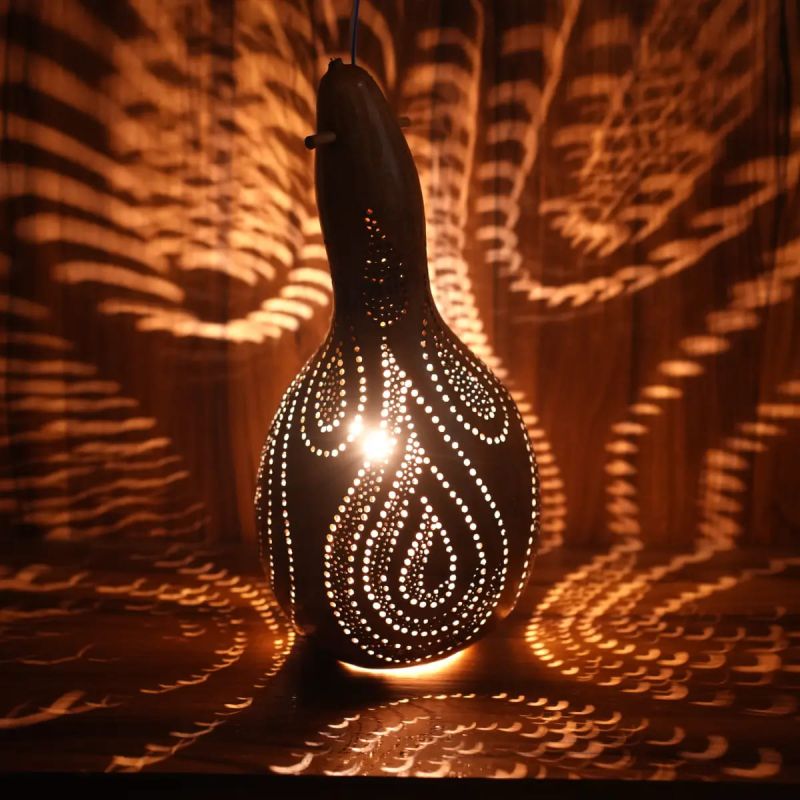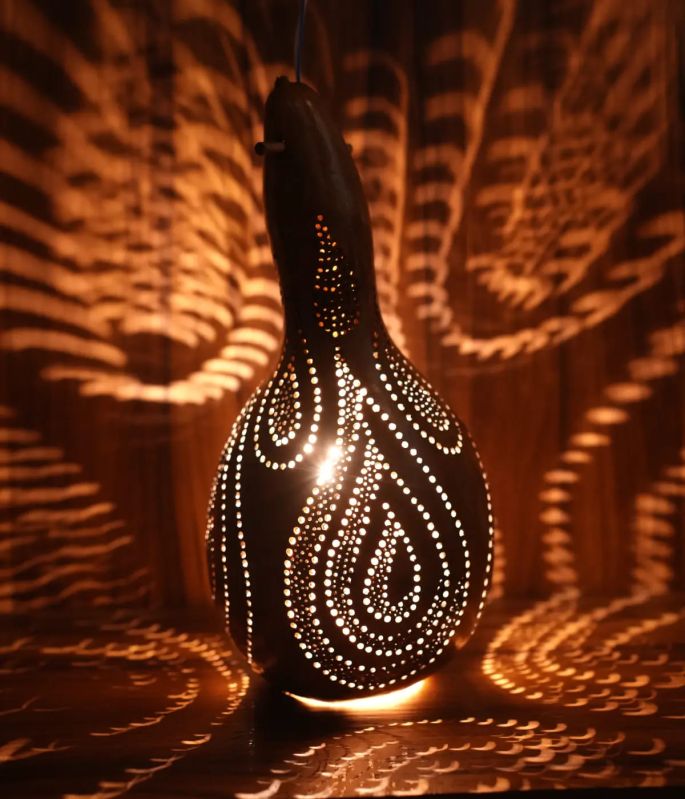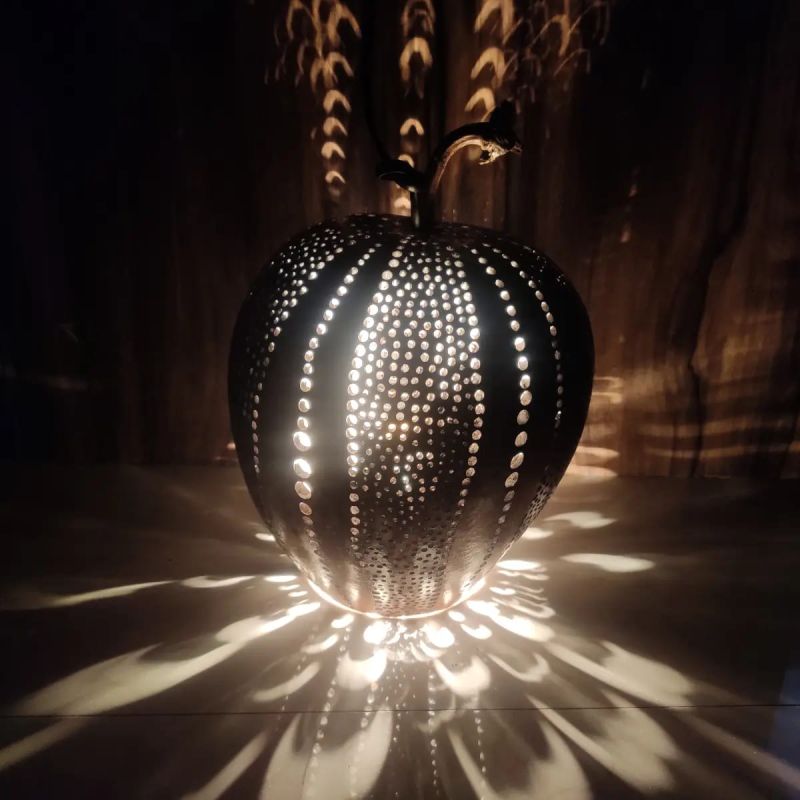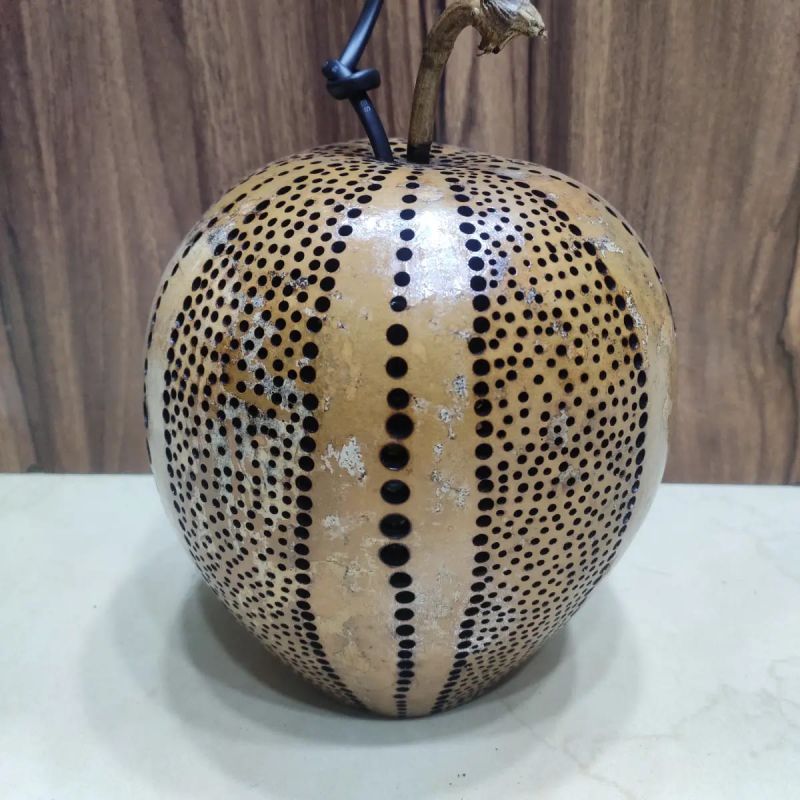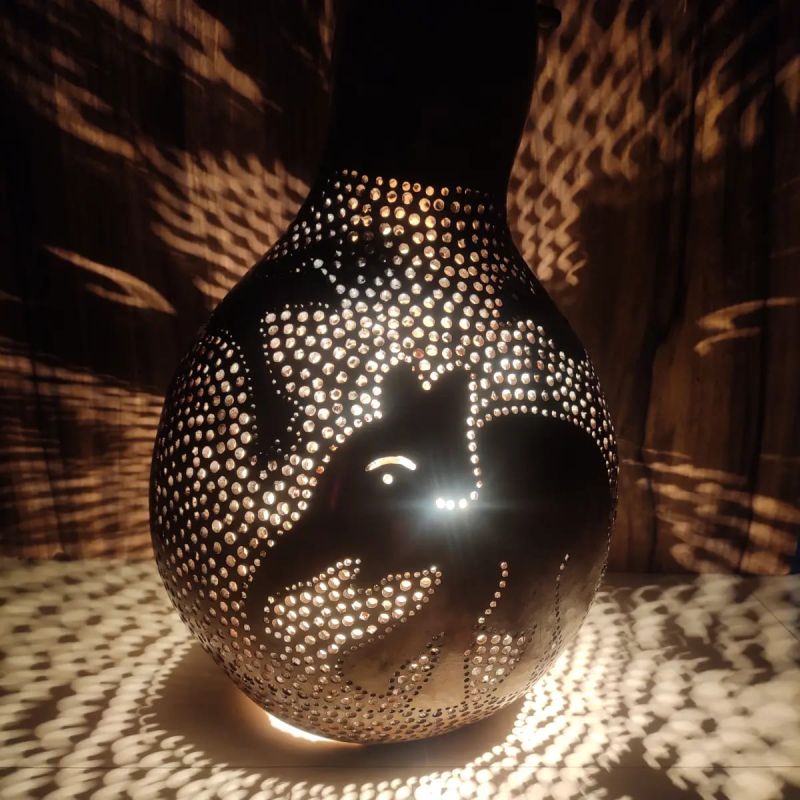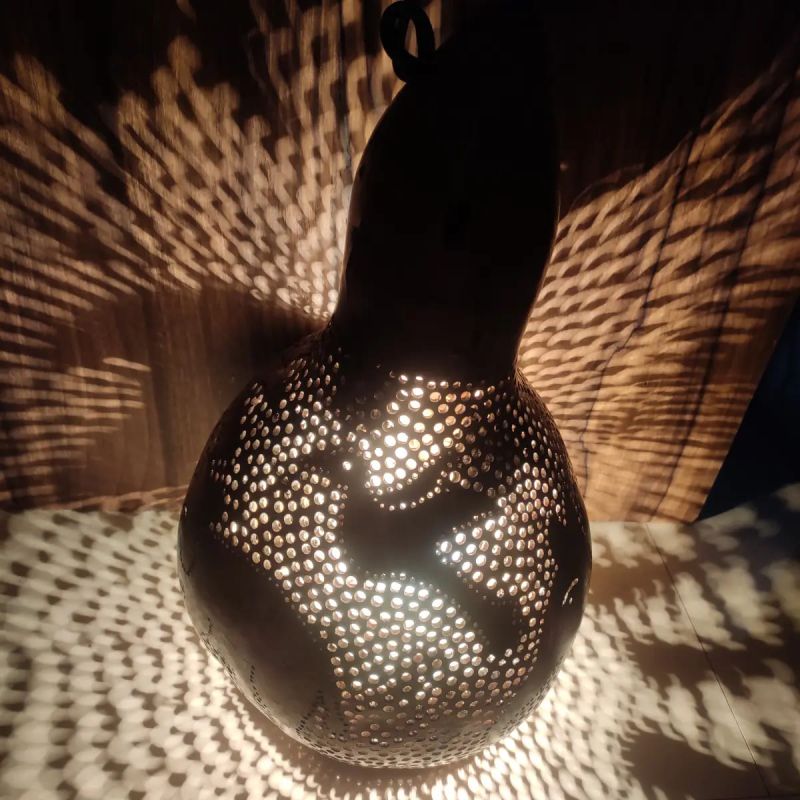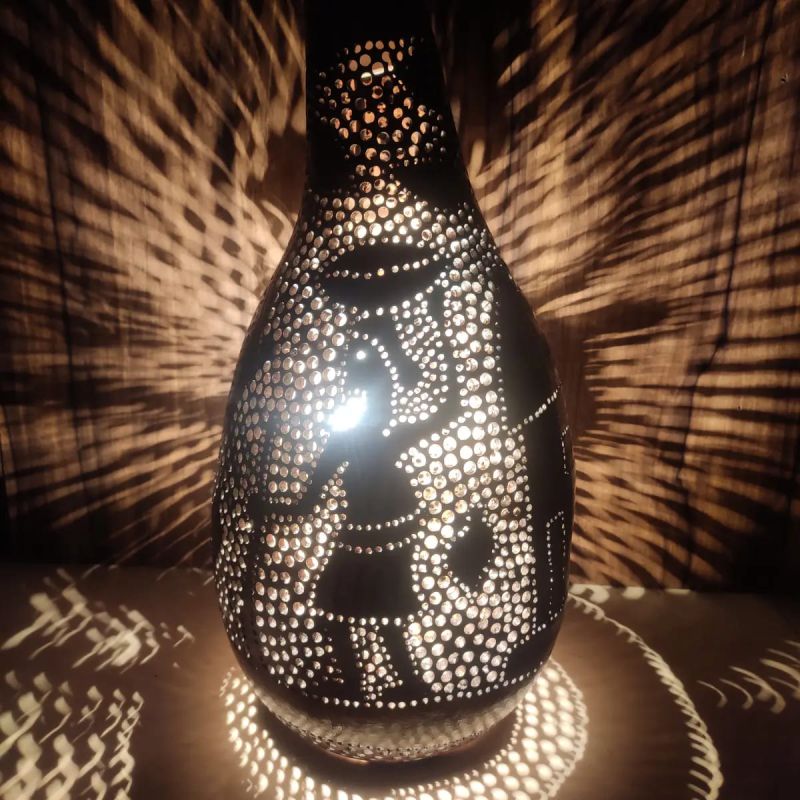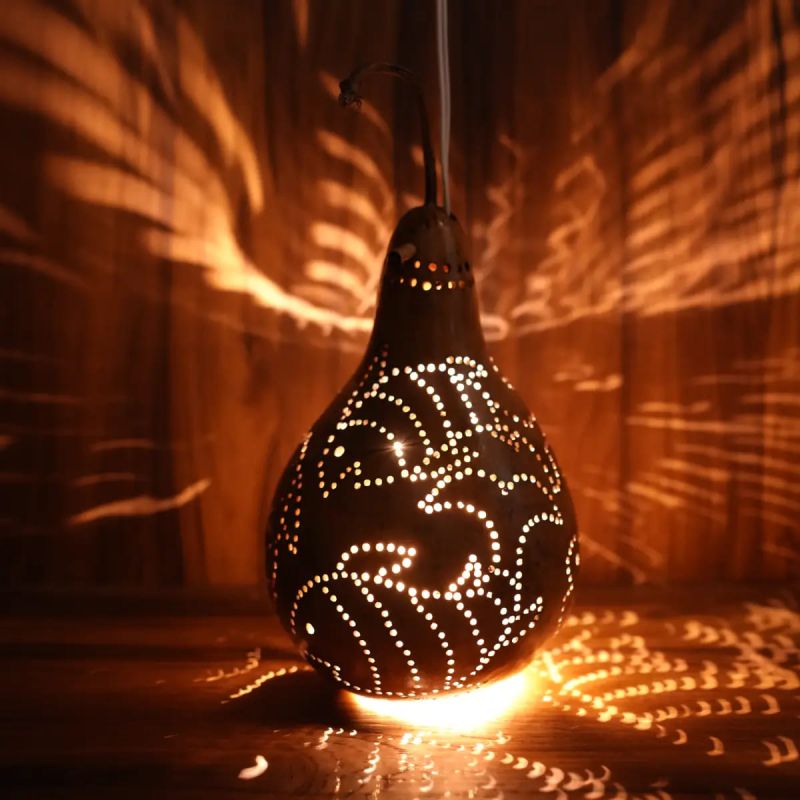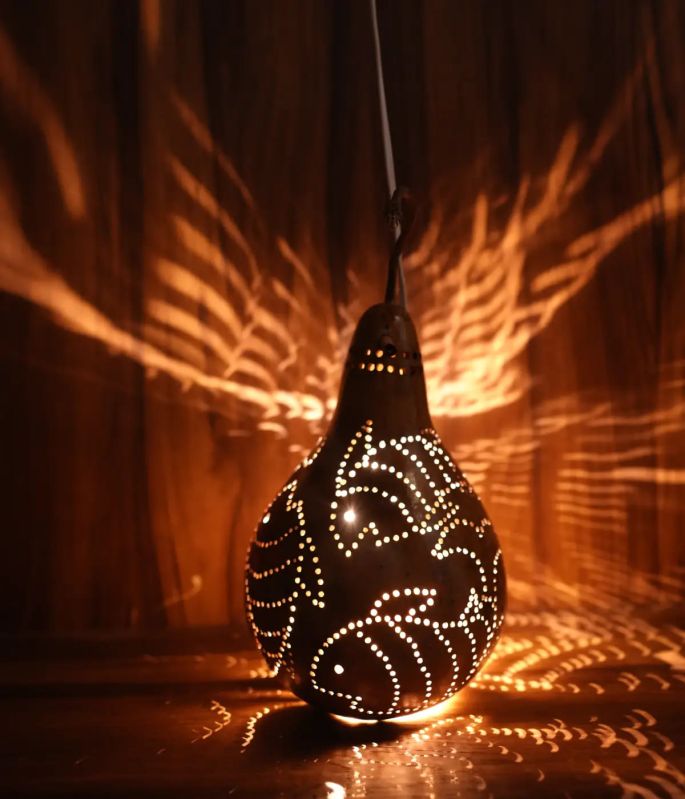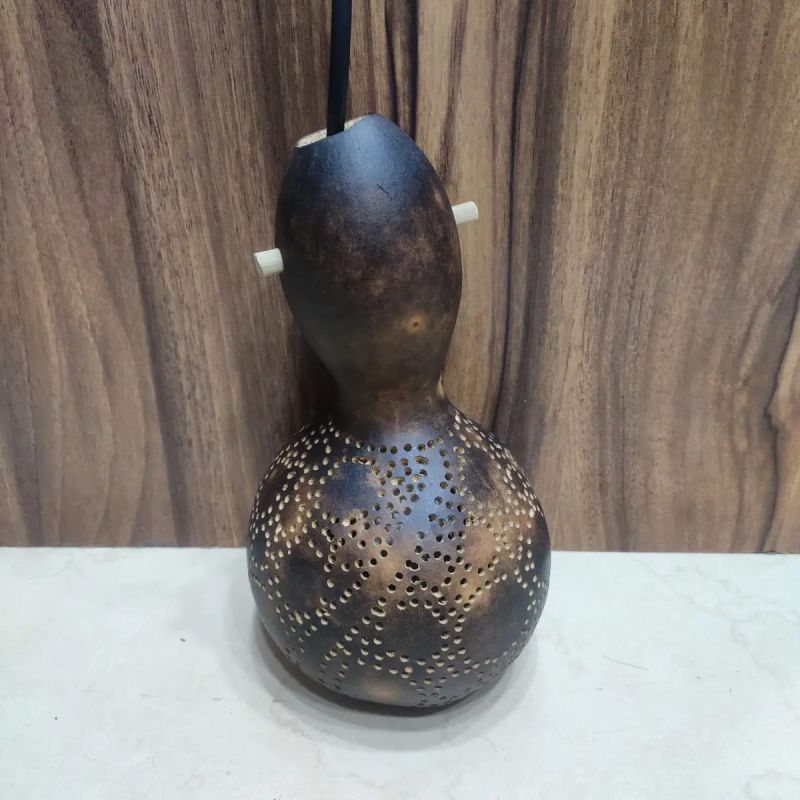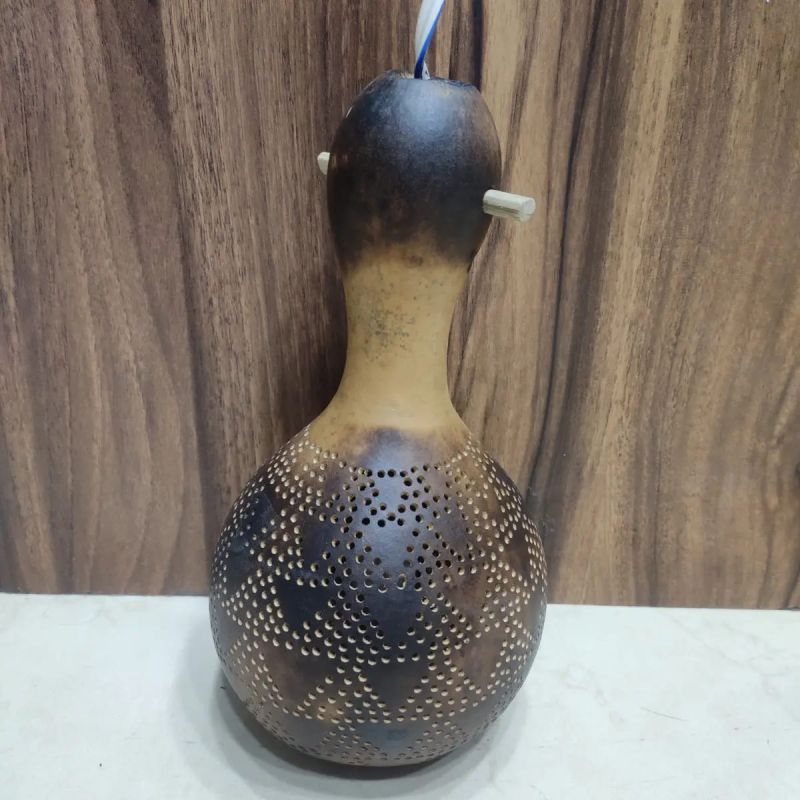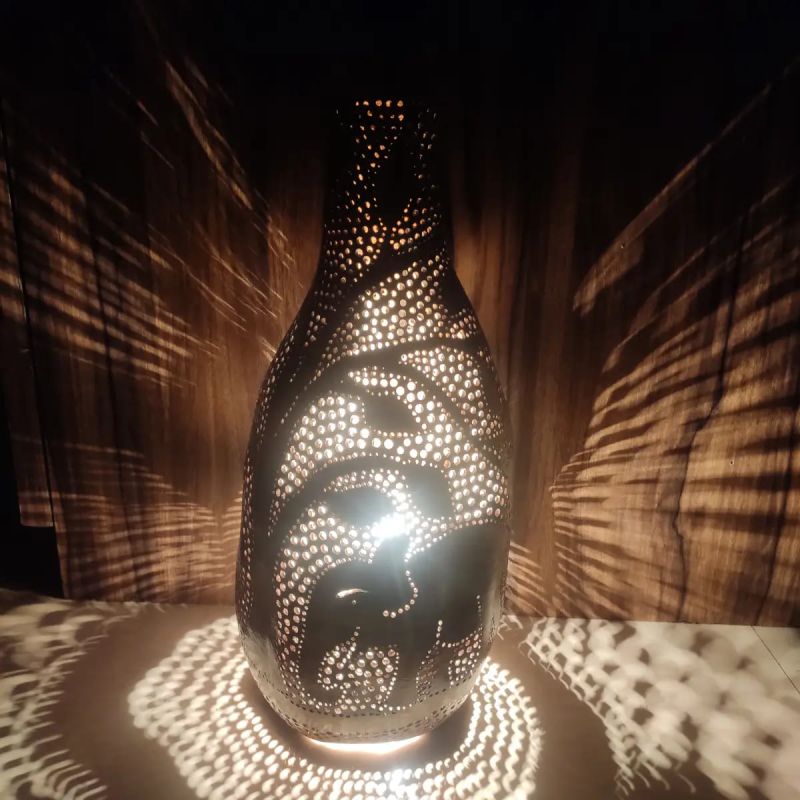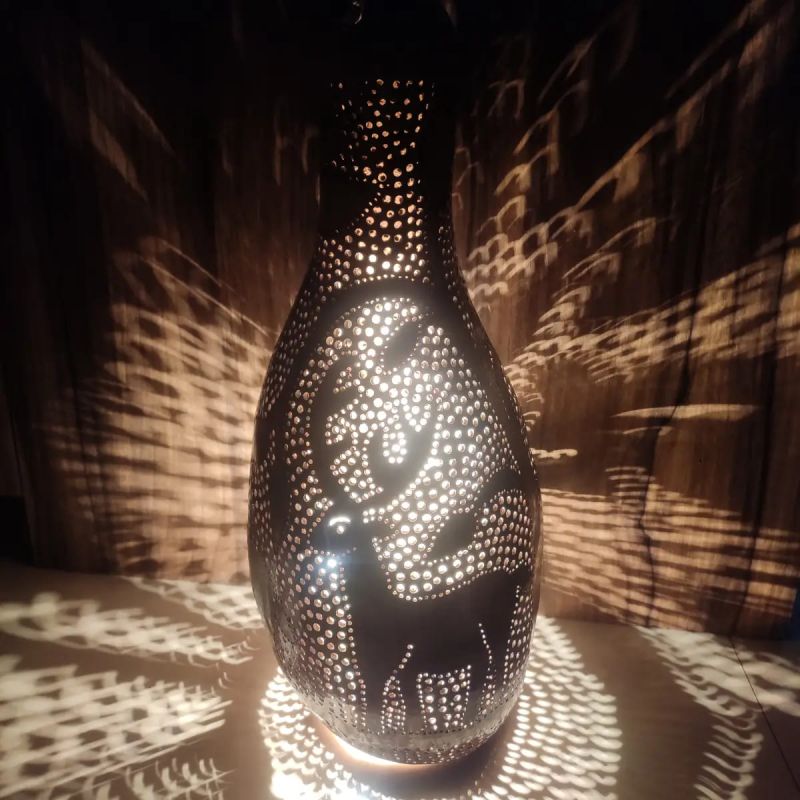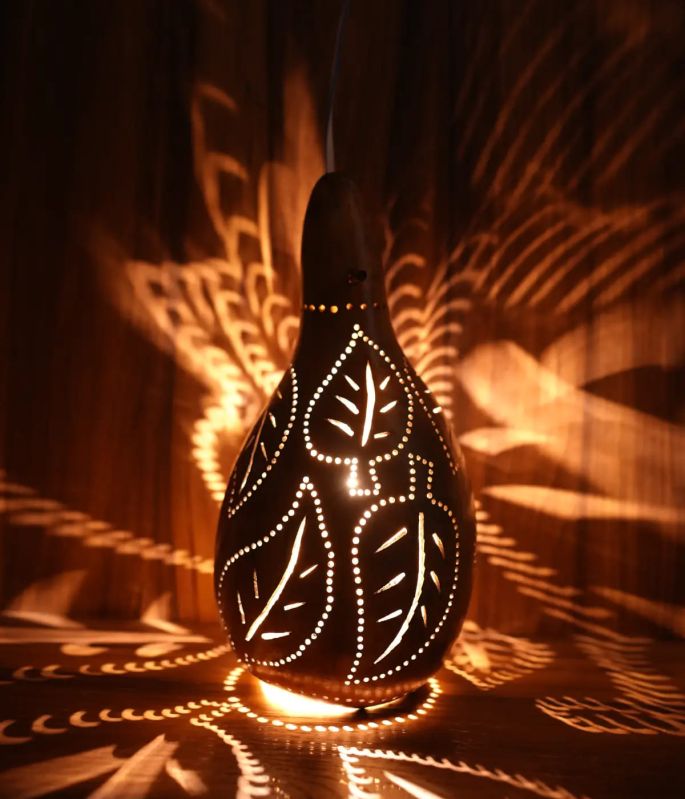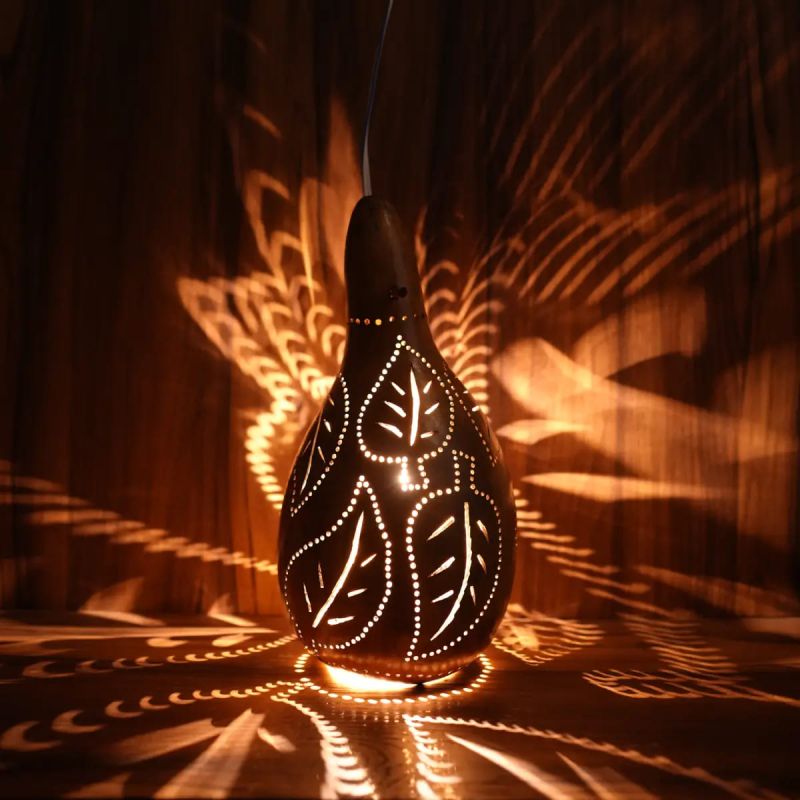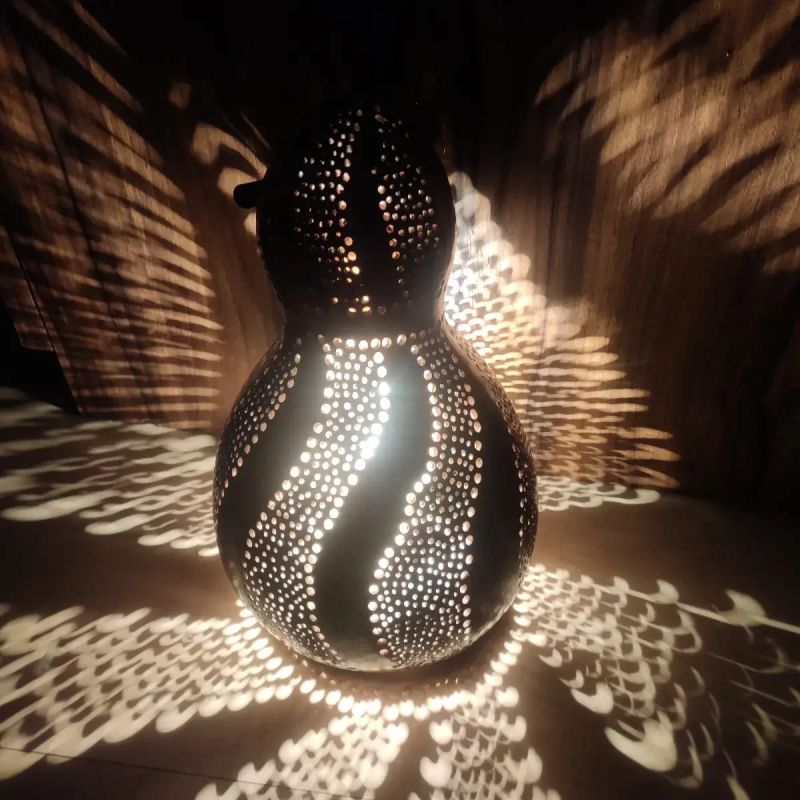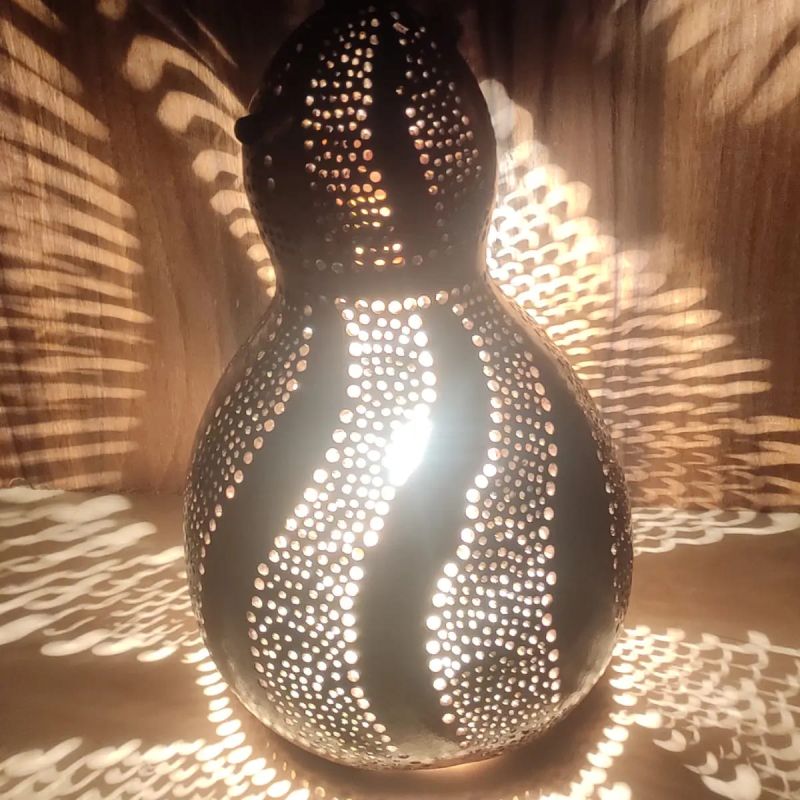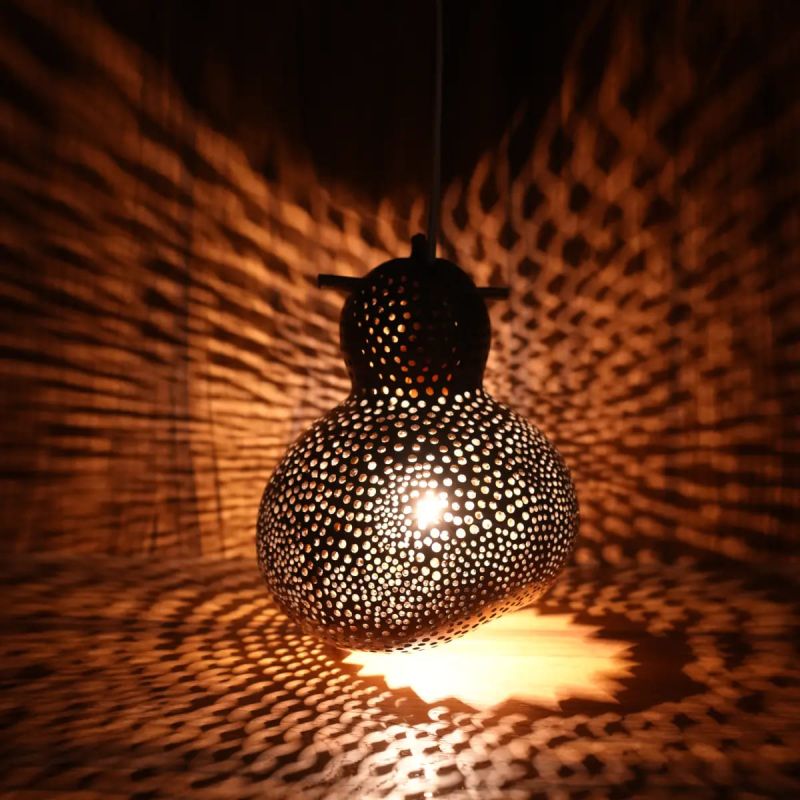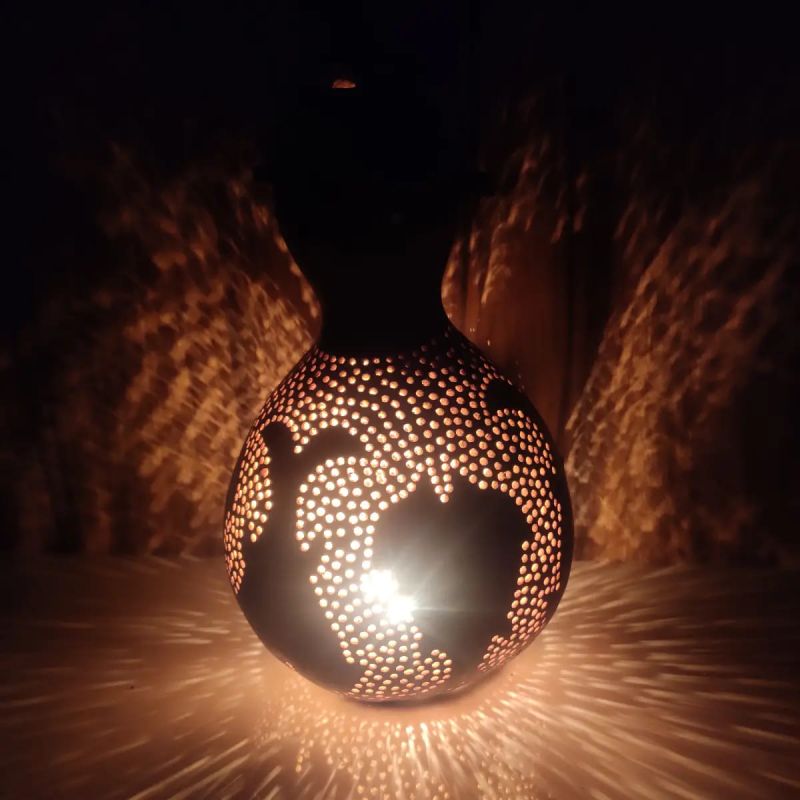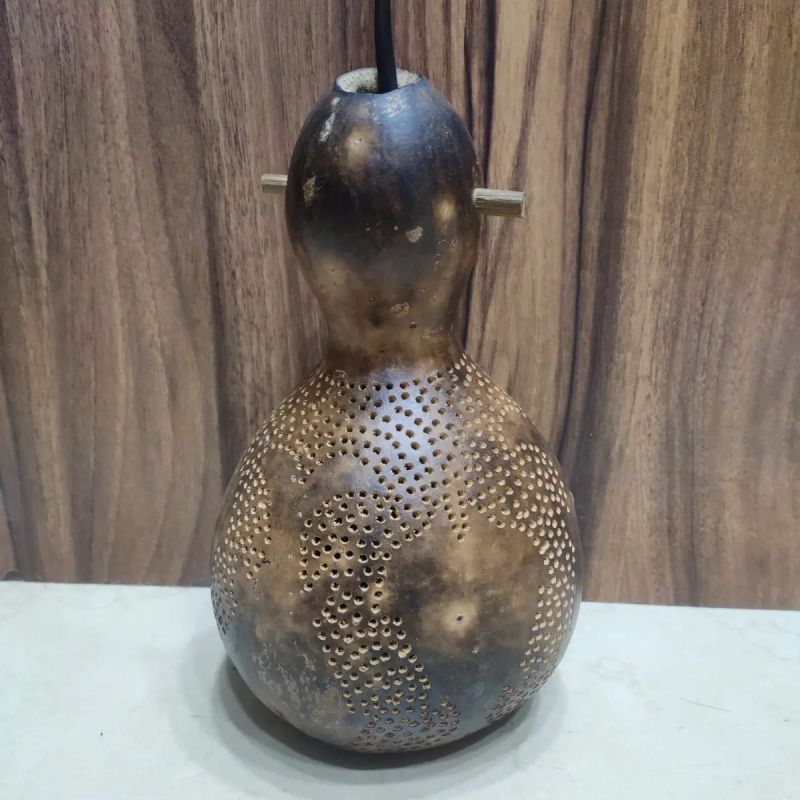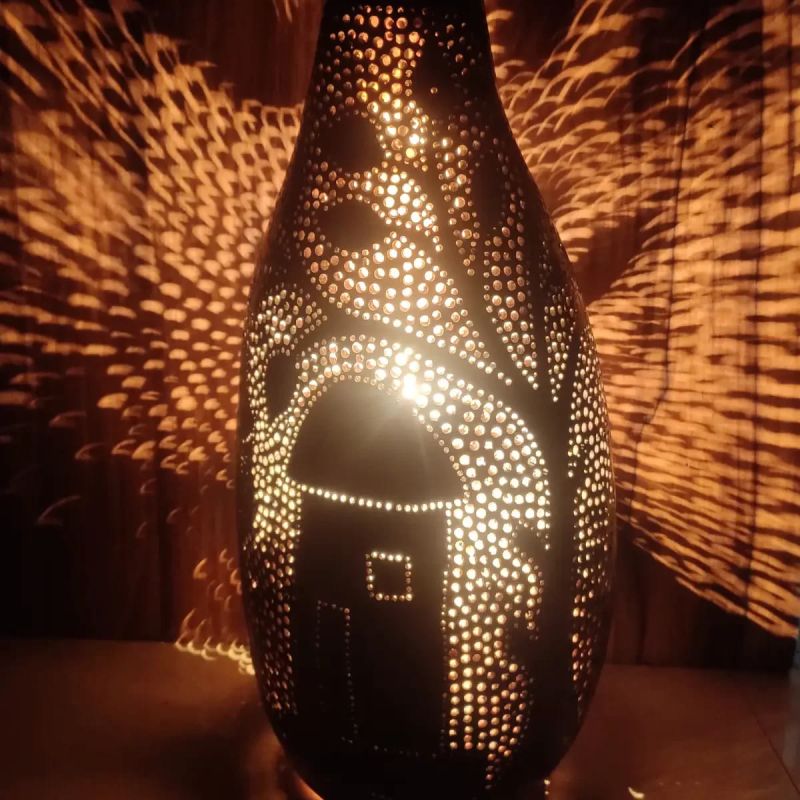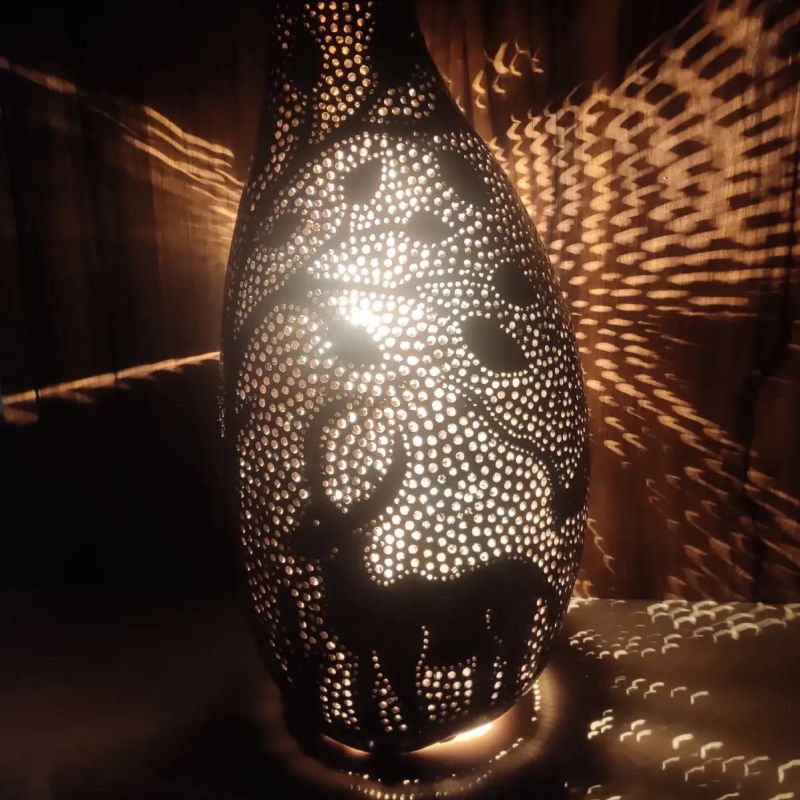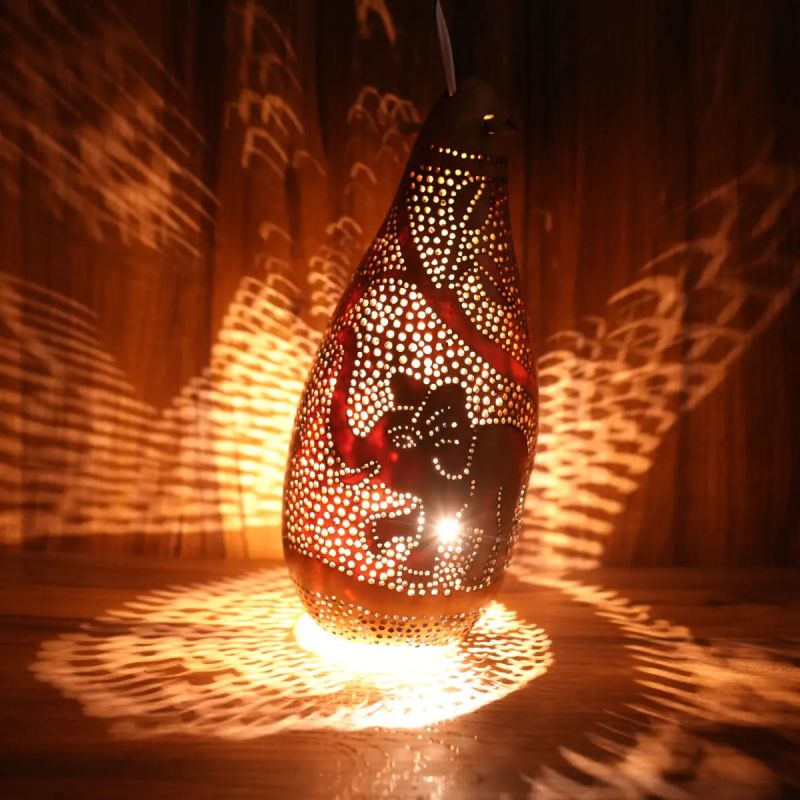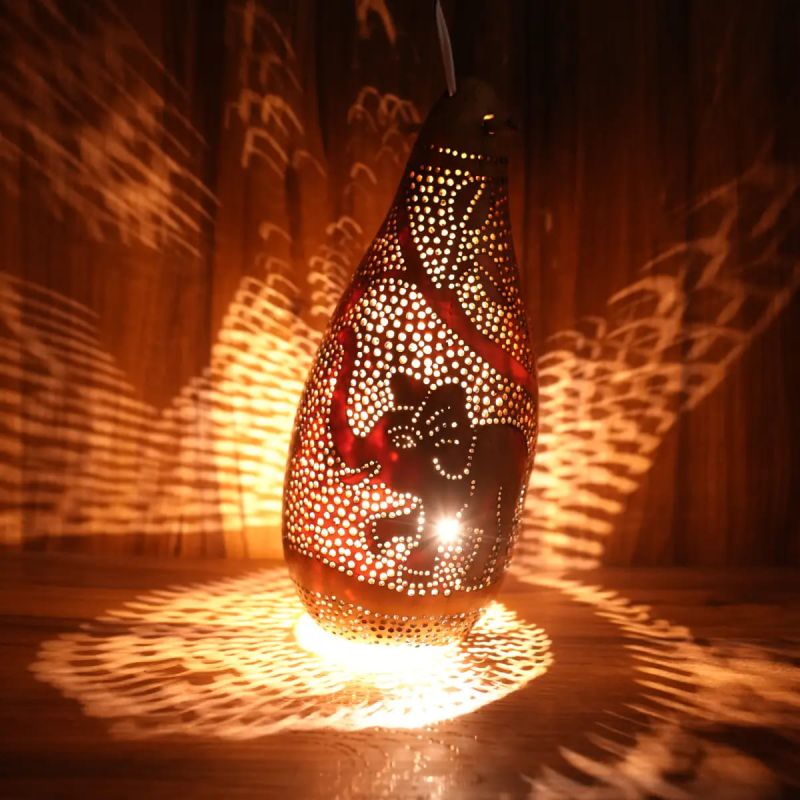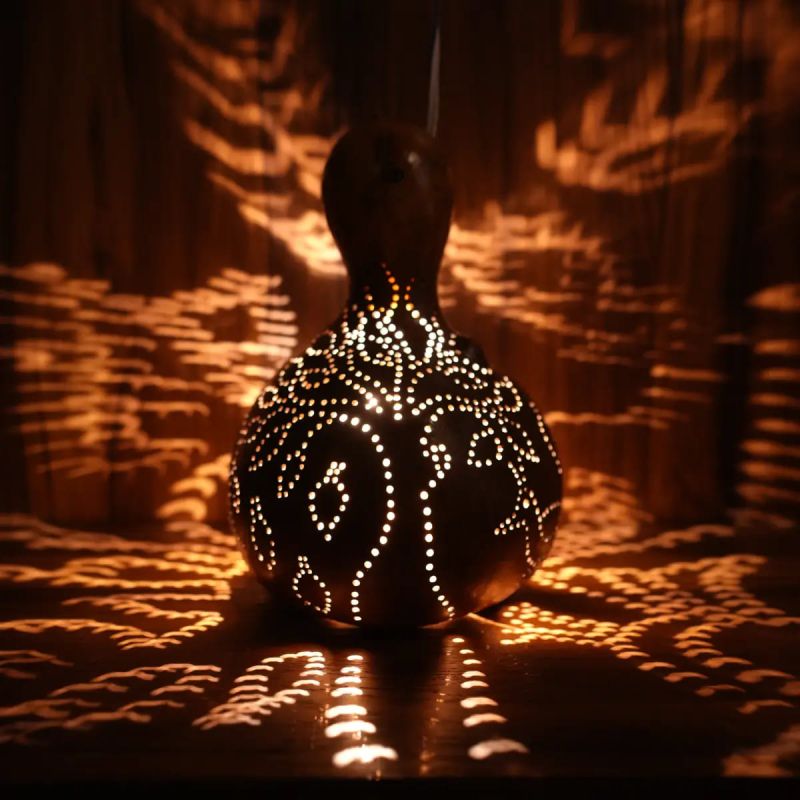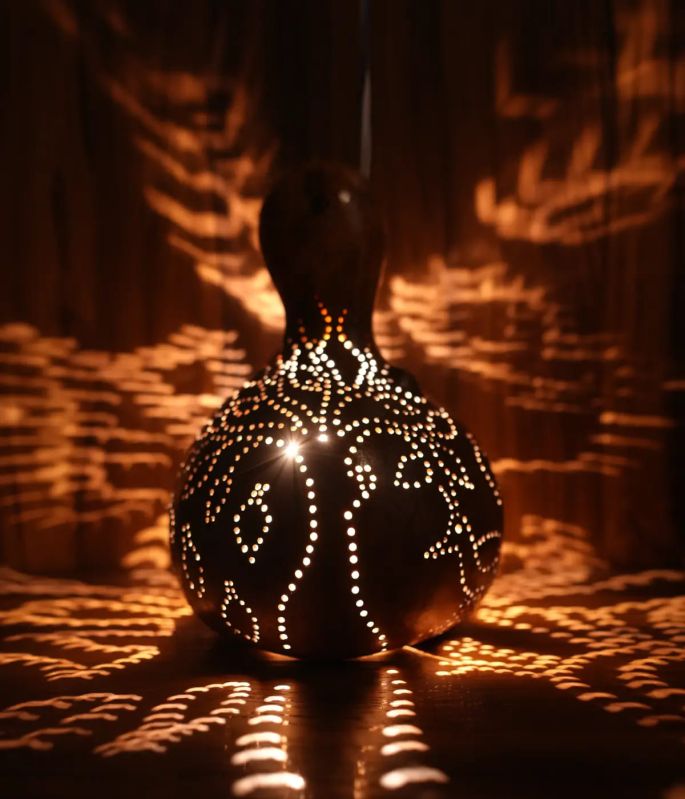Bhilai, Durg, Chhattisgarh
- GST NO. : 22AAFCL6000K1ZV
Tuma Art
Leading Exporters and Wholesaler of Abstract Tuma Art, Apple Touch Tuma Art, Elephant and Bird Tuma Art, Farming Scene Crafted Tuma Art, Fish Sculpture Tuma Art, Geometric Circle Design Tuma Art, Geometric Triangle Design Tuma Art, Jungle Scene Crafted Tuma Art, Leaf Shaped Tuma Art, Random Crafted Design Tuma Art, Simple Carving Tuma Art, Tiny Fishes Crafted Tuma Art, Tribal Lifestyle Crafted Tuma Art, Wildlife Carving Tuma Art and Wildlife Scene Crafted Tuma Art from Durg.
| Business Type | Exporter, Supplier |
| Material | Dried Bottle Gourd |
| Usage | Interior Decor |
| Style | Antique |
| Type | Tuma Art |
| Country of Origin | India |
| Weight | 150 Gms – 400 Gms |
| Utility | Hang this At Your Favorite Spots , also Can Be Placed On Tables or Desks |
| Weightdimensions (lxbxh) Inches | Can Range Different for Different Lamps as These are Natural Vegetables Which Vary from Size to Size |
Preferred Buyer From
| Location | Worldwide |
Abstract Tuma Art
“This art form never fails to mesmerize anyone, carefully crafted with the design of artistic vision in this bottleguard showacases an extreme connected artform with nature.
Tuma art involves transforming dried bottle gourds (Lagenaria siceraria) into intricate and vibrant works of art. Artisans traditionally used gourds for practical purposes like storing water and spices, but gradually began decorating them with intricate designs and motifs, giving birth to this unique art form.
Intricate geometric patterns, floral motifs, and figures are meticulously carved onto the gourd surface.Designs are burned onto the surface using heated tools, creating a dark, contrasting effect.
Tuma art holds deep cultural significance in rural INDIA. It reflects the rich tribal heritage and artistic traditions of communities like the Gond and Bhatra. The motifs and symbols used often carry specific meanings related to nature, deities, and community values.”
Description
Lets learn little more about this art form.
Bottle gourds, also known as lauki in Hindi, have been depicted in art forms across India for centuries. Here’s a breakdown of their relevance:
Symbolism:
Prosperity and Fertility: The bulbous shape of the bottle gourd is associated with abundance and fertility. It’s depicted in still life paintings and murals, particularly in South India.
Auspicious Offering: In Hinduism, bottle gourds are offered to deities like Ganesha and Lakshmi during pujas. They represent well-being and prosperity.
Utensile Making: Dried bottle gourds are traditionally used to make lightweight and durable containers for storing water, food grains, and other household items. These crafted gourds are often decorated with intricate designs.
Musical Instruments: In some parts of India, bottle gourds are used to make string instruments like the tumba and the sitar. The gourd’s hollow core creates a rich sound chamber.
Warli Paintings: The Warli tribe of Maharashtra and Gujarat depicts bottle gourds in their paintings. These geometric and symbolic representations could be associated with harvest or daily life.
Madhubani Paintings: Bottle gourds are a common motif in Madhubani paintings from Bihar. They are depicted alongside other flora and fauna, symbolic of nature’s bounty.
Overall, the bottle gourd’s significance transcends its practical uses. It represents prosperity, fertility, and auspiciousness, making it a recurring theme in Indian art forms.
| Business Type | Exporter, Supplier |
| Material | Dried Bottle Gourd |
| Shape | Round |
| Usage | Interior Decor |
| Style | Antique |
| Packaging Type | Carton Box |
| Type | Tuma Art |
| Country of Origin | India |
| Utility | Hang this At Your Favorite Spots , also Can Be Placed On Tables or Desks |
| Weight | 150 GMS – 400 GMS |
| Weightdimensions (lxbxh) Inches | Can Range Different for Different Lamps as These are Natural Vegetables Which Vary from Size to Size |
Preferred Buyer From
| Location | Worldwide |
Apple Touch to Tuma
“This art form never fails to mesmerize anyone, carefully crafted with the design of artistic vision in this bottleguard showacases an extreme connected artform with nature.
Tuma art involves transforming dried bottle gourds (Lagenaria siceraria) into intricate and vibrant works of art. Artisans traditionally used gourds for practical purposes like storing water and spices, but gradually began decorating them with intricate designs and motifs, giving birth to this unique art form.
Intricate geometric patterns, floral motifs, and figures are meticulously carved onto the gourd surface.Designs are burned onto the surface using heated tools, creating a dark, contrasting effect.
Tuma art holds deep cultural significance in rural INDIA. It reflects the rich tribal heritage and artistic traditions of communities like the Gond and Bhatra. The motifs and symbols used often carry specific meanings related to nature, deities, and community values.”
Description
Lets learn little more about this art form.
Bottle gourds, also known as lauki in Hindi, have been depicted in art forms across India for centuries. Here’s a breakdown of their relevance:
Symbolism:
Prosperity and Fertility: The bulbous shape of the bottle gourd is associated with abundance and fertility. It’s depicted in still life paintings and murals, particularly in South India.
Auspicious Offering: In Hinduism, bottle gourds are offered to deities like Ganesha and Lakshmi during pujas. They represent well-being and prosperity.
Utensile Making: Dried bottle gourds are traditionally used to make lightweight and durable containers for storing water, food grains, and other household items. These crafted gourds are often decorated with intricate designs.
Musical Instruments: In some parts of India, bottle gourds are used to make string instruments like the tumba and the sitar. The gourd’s hollow core creates a rich sound chamber.
Warli Paintings: The Warli tribe of Maharashtra and Gujarat depicts bottle gourds in their paintings. These geometric and symbolic representations could be associated with harvest or daily life.
Madhubani Paintings: Bottle gourds are a common motif in Madhubani paintings from Bihar. They are depicted alongside other flora and fauna, symbolic of nature’s bounty.
Overall, the bottle gourd’s significance transcends its practical uses. It represents prosperity, fertility, and auspiciousness, making it a recurring theme in Indian art forms.
| Business Type | Exporter, Supplier |
| Material | Dried Bottle Gourd |
| Usage | Interior Decor |
| Style | Antique |
| Packaging Type | Carton Box |
| Type | Tuma Art |
| Country of Origin | India |
| Utility | Hang this At Your Favorite Spots , also Can Be Placed On Tables or Desks |
| Weight | 150 Gms – 400 Gms |
| Weightdimensions (lxbxh) Inches | Can Range Different for Different Lamps as These are Natural Vegetables Which Vary from Size to Size |
Preferred Buyer From
| Location | Worldwide |
Elephant and Bird Bond on Tuma
“This art form never fails to mesmerize anyone, carefully crafted with the design of artistic vision in this bottleguard showacases an extreme connected artform with nature.
Tuma art involves transforming dried bottle gourds (Lagenaria siceraria) into intricate and vibrant works of art. Artisans traditionally used gourds for practical purposes like storing water and spices, but gradually began decorating them with intricate designs and motifs, giving birth to this unique art form.
Intricate geometric patterns, floral motifs, and figures are meticulously carved onto the gourd surface.Designs are burned onto the surface using heated tools, creating a dark, contrasting effect.
Tuma art holds deep cultural significance in rural INDIA. It reflects the rich tribal heritage and artistic traditions of communities like the Gond and Bhatra. The motifs and symbols used often carry specific meanings related to nature, deities, and community values.”
Description
Lets learn little more about this art form.
Bottle gourds, also known as lauki in Hindi, have been depicted in art forms across India for centuries. Here’s a breakdown of their relevance:
Symbolism:
Prosperity and Fertility: The bulbous shape of the bottle gourd is associated with abundance and fertility. It’s depicted in still life paintings and murals, particularly in South India.
Auspicious Offering: In Hinduism, bottle gourds are offered to deities like Ganesha and Lakshmi during pujas. They represent well-being and prosperity.
Utensile Making: Dried bottle gourds are traditionally used to make lightweight and durable containers for storing water, food grains, and other household items. These crafted gourds are often decorated with intricate designs.
Musical Instruments: In some parts of India, bottle gourds are used to make string instruments like the tumba and the sitar. The gourd’s hollow core creates a rich sound chamber.
Warli Paintings: The Warli tribe of Maharashtra and Gujarat depicts bottle gourds in their paintings. These geometric and symbolic representations could be associated with harvest or daily life.
Madhubani Paintings: Bottle gourds are a common motif in Madhubani paintings from Bihar. They are depicted alongside other flora and fauna, symbolic of nature’s bounty.
Overall, the bottle gourd’s significance transcends its practical uses. It represents prosperity, fertility, and auspiciousness, making it a recurring theme in Indian art forms.
| Business Type | Exporter, Supplier |
| Material | Dried Bottle Gourd |
| Usage | Interior Decor |
| Style | Antique |
| Packaging Type | Carton Box |
| Type | Tuma Art |
| Country of Origin | India |
| Utility | Hang this At Your Favorite Spots , also Can Be Placed On Tables or Desks |
| Weight | 150 Gms – 400 Gms |
| Weightdimensions (lxbxh) Inches | Can Range Different for Different Lamps as These are Natural Vegetables Which Vary from Size to Size |
Preferred Buyer From
| Location | Worldwide |
Farming Scene crafted on Tuma
“This art form never fails to mesmerize anyone, carefully crafted with the design of artistic vision in this bottleguard showacases an extreme connected artform with nature.
Tuma art involves transforming dried bottle gourds (Lagenaria siceraria) into intricate and vibrant works of art. Artisans traditionally used gourds for practical purposes like storing water and spices, but gradually began decorating them with intricate designs and motifs, giving birth to this unique art form.
Intricate geometric patterns, floral motifs, and figures are meticulously carved onto the gourd surface.Designs are burned onto the surface using heated tools, creating a dark, contrasting effect.
Tuma art holds deep cultural significance in rural INDIA. It reflects the rich tribal heritage and artistic traditions of communities like the Gond and Bhatra. The motifs and symbols used often carry specific meanings related to nature, deities, and community values.”
Description
Lets learn little more about this art form.
Bottle gourds, also known as lauki in Hindi, have been depicted in art forms across India for centuries. Here’s a breakdown of their relevance:
Symbolism:
Prosperity and Fertility: The bulbous shape of the bottle gourd is associated with abundance and fertility. It’s depicted in still life paintings and murals, particularly in South India.
Auspicious Offering: In Hinduism, bottle gourds are offered to deities like Ganesha and Lakshmi during pujas. They represent well-being and prosperity.
Utensile Making: Dried bottle gourds are traditionally used to make lightweight and durable containers for storing water, food grains, and other household items. These crafted gourds are often decorated with intricate designs.
Musical Instruments: In some parts of India, bottle gourds are used to make string instruments like the tumba and the sitar. The gourd’s hollow core creates a rich sound chamber.
Warli Paintings: The Warli tribe of Maharashtra and Gujarat depicts bottle gourds in their paintings. These geometric and symbolic representations could be associated with harvest or daily life.
Madhubani Paintings: Bottle gourds are a common motif in Madhubani paintings from Bihar. They are depicted alongside other flora and fauna, symbolic of nature’s bounty.
Overall, the bottle gourd’s significance transcends its practical uses. It represents prosperity, fertility, and auspiciousness, making it a recurring theme in Indian art forms.
| Business Type | Exporter, Supplier |
| Material | Dried Bottle Gourd |
| Usage | Interior Decor |
| Style | Antique |
| Packaging Type | Carton Box |
| Type | Tuma Art |
| Country of Origin | India |
| Weight | 150 Gms – 400 Gms |
| Utility | Hang this At Your Favorite Spots , also Can Be Placed On Tables or Desks |
| Weightdimensions | Can Range Different for Different Lamps as These are Natural Vegetables Which Vary from Size to Size |
Preferred Buyer From
| Location | Worldwide |
Tuma Fish Sculpture
“This art form never fails to mesmerize anyone, carefully crafted with the design of fish in this bottleguard showacases an extreme connected artform with nature.
Tuma art involves transforming dried bottle gourds (Lagenaria siceraria) into intricate and vibrant works of art. Artisans traditionally used gourds for practical purposes like storing water and spices, but gradually began decorating them with intricate designs and motifs, giving birth to this unique art form.
Intricate geometric patterns, floral motifs, and figures are meticulously carved onto the gourd surface.Designs are burned onto the surface using heated tools, creating a dark, contrasting effect.
Tuma art holds deep cultural significance in rural INDIA. It reflects the rich tribal heritage and artistic traditions of communities like the Gond and Bhatra. The motifs and symbols used often carry specific meanings related to nature, deities, and community values.”
Description
Lets learn little more about this art form.
Bottle gourds, also known as lauki in Hindi, have been depicted in art forms across India for centuries. Here’s a breakdown of their relevance:
Symbolism:
Prosperity and Fertility: The bulbous shape of the bottle gourd is associated with abundance and fertility. It’s depicted in still life paintings and murals, particularly in South India.
Auspicious Offering: In Hinduism, bottle gourds are offered to deities like Ganesha and Lakshmi during pujas. They represent well-being and prosperity.
Utensile Making: Dried bottle gourds are traditionally used to make lightweight and durable containers for storing water, food grains, and other household items. These crafted gourds are often decorated with intricate designs.
Musical Instruments: In some parts of India, bottle gourds are used to make string instruments like the tumba and the sitar. The gourd’s hollow core creates a rich sound chamber.
Warli Paintings: The Warli tribe of Maharashtra and Gujarat depicts bottle gourds in their paintings. These geometric and symbolic representations could be associated with harvest or daily life.
Madhubani Paintings: Bottle gourds are a common motif in Madhubani paintings from Bihar. They are depicted alongside other flora and fauna, symbolic of nature’s bounty.
Overall, the bottle gourd’s significance transcends its practical uses. It represents prosperity, fertility, and auspiciousness, making it a recurring theme in Indian art forms.
| Business Type | Exporter, Supplier |
| Material | Dried Bottle Gourd |
| Usage | Interior Decor |
| Style | Antique |
| Packaging Type | Carton Box |
| Type | Tuma Art |
| Country of Origin | India |
| Weight | 150 Gms – 400 Gms |
| Utility | Hang this At Your Favorite Spots , also Can Be Placed On Tables or Desks |
| Weightdimensions (lxbxh) Inches | Can Range Different for Different Lamps as These are Natural Vegetables Which Vary from Size to Size |
Preferred Buyer From
| Location | Worldwide |
Geometric Design on Tuma (Circles)
“This art form never fails to mesmerize anyone, carefully crafted with the design of artistic vision in this bottleguard showacases an extreme connected artform with nature.
Tuma art involves transforming dried bottle gourds (Lagenaria siceraria) into intricate and vibrant works of art. Artisans traditionally used gourds for practical purposes like storing water and spices, but gradually began decorating them with intricate designs and motifs, giving birth to this unique art form.
Intricate geometric patterns, floral motifs, and figures are meticulously carved onto the gourd surface.Designs are burned onto the surface using heated tools, creating a dark, contrasting effect.
Tuma art holds deep cultural significance in rural INDIA. It reflects the rich tribal heritage and artistic traditions of communities like the Gond and Bhatra. The motifs and symbols used often carry specific meanings related to nature, deities, and community values.”
Description
Lets learn little more about this art form.
Bottle gourds, also known as lauki in Hindi, have been depicted in art forms across India for centuries. Here’s a breakdown of their relevance:
Symbolism:
Prosperity and Fertility: The bulbous shape of the bottle gourd is associated with abundance and fertility. It’s depicted in still life paintings and murals, particularly in South India.
Auspicious Offering: In Hinduism, bottle gourds are offered to deities like Ganesha and Lakshmi during pujas. They represent well-being and prosperity.
Utensile Making: Dried bottle gourds are traditionally used to make lightweight and durable containers for storing water, food grains, and other household items. These crafted gourds are often decorated with intricate designs.
Musical Instruments: In some parts of India, bottle gourds are used to make string instruments like the tumba and the sitar. The gourd’s hollow core creates a rich sound chamber.
Warli Paintings: The Warli tribe of Maharashtra and Gujarat depicts bottle gourds in their paintings. These geometric and symbolic representations could be associated with harvest or daily life.
Madhubani Paintings: Bottle gourds are a common motif in Madhubani paintings from Bihar. They are depicted alongside other flora and fauna, symbolic of nature’s bounty.
Overall, the bottle gourd’s significance transcends its practical uses. It represents prosperity, fertility, and auspiciousness, making it a recurring theme in Indian art forms.
| Business Type | Exporter, Supplier |
| Material | Dried Bottle Gourd |
| Usage | Interior Decor |
| Style | Antique |
| Packaging Type | Carton Box |
| Type | Tuma Art |
| Country of Origin | India |
| Weight | 150 Gms – 400 Gms |
| Utility | Hang this At Your Favorite Spots , also Can Be Placed On Tables or Desks |
| Weightdimensions (lxbxh) Inches | Can Range Different for Different Lamps as These are Natural Vegetables Which Vary from Size to Size |
Preferred Buyer From
| Location | Worldwide |
Geometric Design on Tuma (Triangles)
“This art form never fails to mesmerize anyone, carefully crafted with the design of artistic vision in this bottleguard showacases an extreme connected artform with nature.
Tuma art involves transforming dried bottle gourds (Lagenaria siceraria) into intricate and vibrant works of art. Artisans traditionally used gourds for practical purposes like storing water and spices, but gradually began decorating them with intricate designs and motifs, giving birth to this unique art form.
Intricate geometric patterns, floral motifs, and figures are meticulously carved onto the gourd surface.Designs are burned onto the surface using heated tools, creating a dark, contrasting effect.
Tuma art holds deep cultural significance in rural INDIA. It reflects the rich tribal heritage and artistic traditions of communities like the Gond and Bhatra. The motifs and symbols used often carry specific meanings related to nature, deities, and community values.”
Description
Lets learn little more about this art form.
Bottle gourds, also known as lauki in Hindi, have been depicted in art forms across India for centuries. Here’s a breakdown of their relevance:
Symbolism:
Prosperity and Fertility: The bulbous shape of the bottle gourd is associated with abundance and fertility. It’s depicted in still life paintings and murals, particularly in South India.
Auspicious Offering: In Hinduism, bottle gourds are offered to deities like Ganesha and Lakshmi during pujas. They represent well-being and prosperity.
Utensile Making: Dried bottle gourds are traditionally used to make lightweight and durable containers for storing water, food grains, and other household items. These crafted gourds are often decorated with intricate designs.
Musical Instruments: In some parts of India, bottle gourds are used to make string instruments like the tumba and the sitar. The gourd’s hollow core creates a rich sound chamber.
Warli Paintings: The Warli tribe of Maharashtra and Gujarat depicts bottle gourds in their paintings. These geometric and symbolic representations could be associated with harvest or daily life.
Madhubani Paintings: Bottle gourds are a common motif in Madhubani paintings from Bihar. They are depicted alongside other flora and fauna, symbolic of nature’s bounty.
Overall, the bottle gourd’s significance transcends its practical uses. It represents prosperity, fertility, and auspiciousness, making it a recurring theme in Indian art forms.
| Business Type | Exporter, Supplier |
| Material | Dried Bottle Gourd |
| Usage | Interior Decor |
| Style | Antique |
| Packaging Type | Carton Box |
| Type | Tuma Art |
| Country of Origin | India |
| Utility | Hang this At Your Favorite Spots , also Can Be Placed On Tables or Desks |
| Weight | 150 Gms – 400 Gms |
| Weightdimensions (lxbxh) Inches | Can Range Different for Different Lamps as These are Natural Vegetables Which Vary from Size to Size |
Preferred Buyer From
| Location | Worldwide |
The Jungle Scene crafted on Tuma
“This art form never fails to mesmerize anyone, carefully crafted with the design of artistic vision in this bottleguard showacases an extreme connected artform with nature.
Tuma art involves transforming dried bottle gourds (Lagenaria siceraria) into intricate and vibrant works of art. Artisans traditionally used gourds for practical purposes like storing water and spices, but gradually began decorating them with intricate designs and motifs, giving birth to this unique art form.
Intricate geometric patterns, floral motifs, and figures are meticulously carved onto the gourd surface.Designs are burned onto the surface using heated tools, creating a dark, contrasting effect.
Tuma art holds deep cultural significance in rural INDIA. It reflects the rich tribal heritage and artistic traditions of communities like the Gond and Bhatra. The motifs and symbols used often carry specific meanings related to nature, deities, and community values.”
Description
Lets learn little more about this art form.
Bottle gourds, also known as lauki in Hindi, have been depicted in art forms across India for centuries. Here’s a breakdown of their relevance:
Symbolism:
Prosperity and Fertility: The bulbous shape of the bottle gourd is associated with abundance and fertility. It’s depicted in still life paintings and murals, particularly in South India.
Auspicious Offering: In Hinduism, bottle gourds are offered to deities like Ganesha and Lakshmi during pujas. They represent well-being and prosperity.
Utensile Making: Dried bottle gourds are traditionally used to make lightweight and durable containers for storing water, food grains, and other household items. These crafted gourds are often decorated with intricate designs.
Musical Instruments: In some parts of India, bottle gourds are used to make string instruments like the tumba and the sitar. The gourd’s hollow core creates a rich sound chamber.
Warli Paintings: The Warli tribe of Maharashtra and Gujarat depicts bottle gourds in their paintings. These geometric and symbolic representations could be associated with harvest or daily life.
Madhubani Paintings: Bottle gourds are a common motif in Madhubani paintings from Bihar. They are depicted alongside other flora and fauna, symbolic of nature’s bounty.
Overall, the bottle gourd’s significance transcends its practical uses. It represents prosperity, fertility, and auspiciousness, making it a recurring theme in Indian art forms.
| Business Type | Exporter, Supplier |
| Material | Dried Bottle Gourd |
| Usage | Interior Decor |
| Style | Antique |
| Packaging Type | Carton Box |
| Type | Tuma Art |
| Country of Origin | India |
| Weight | 150 Gms – 400 Gms |
| Utility | Hang this At Your Favorite Spots , also Can Be Placed On Tables or Desks |
| Weightdimensions (lxbxh) Inches | Can Range Different for Different Lamps as These are Natural Vegetables Which Vary from Size to Size |
Preferred Buyer From
| Location | Worldwide |
Leaf Shaped Tuma Art
“This art form never fails to mesmerize anyone, carefully crafted with the design of leaves in this bottleguard showacases an extreme connected artform with nature.
Tuma art involves transforming dried bottle gourds (Lagenaria siceraria) into intricate and vibrant works of art. Artisans traditionally used gourds for practical purposes like storing water and spices, but gradually began decorating them with intricate designs and motifs, giving birth to this unique art form.
Intricate geometric patterns, floral motifs, and figures are meticulously carved onto the gourd surface.Designs are burned onto the surface using heated tools, creating a dark, contrasting effect.
Tuma art holds deep cultural significance in rural INDIA. It reflects the rich tribal heritage and artistic traditions of communities like the Gond and Bhatra. The motifs and symbols used often carry specific meanings related to nature, deities, and community values.”
Description
Lets learn little more about this art form.
Bottle gourds, also known as lauki in Hindi, have been depicted in art forms across India for centuries. Here’s a breakdown of their relevance:
Symbolism:
Prosperity and Fertility: The bulbous shape of the bottle gourd is associated with abundance and fertility. It’s depicted in still life paintings and murals, particularly in South India.
Auspicious Offering: In Hinduism, bottle gourds are offered to deities like Ganesha and Lakshmi during pujas. They represent well-being and prosperity.
Utensile Making: Dried bottle gourds are traditionally used to make lightweight and durable containers for storing water, food grains, and other household items. These crafted gourds are often decorated with intricate designs.
Musical Instruments: In some parts of India, bottle gourds are used to make string instruments like the tumba and the sitar. The gourd’s hollow core creates a rich sound chamber.
Warli Paintings: The Warli tribe of Maharashtra and Gujarat depicts bottle gourds in their paintings. These geometric and symbolic representations could be associated with harvest or daily life.
Madhubani Paintings: Bottle gourds are a common motif in Madhubani paintings from Bihar. They are depicted alongside other flora and fauna, symbolic of nature’s bounty.
Overall, the bottle gourd’s significance transcends its practical uses. It represents prosperity, fertility, and auspiciousness, making it a recurring theme in Indian art forms.
| Business Type | Exporter, Supplier |
| Material | Dried Bottle Gourd |
| Usage | Interior Decor |
| Style | Antique |
| Packaging Type | Carton Box |
| Type | Tuma Art |
| Country of Origin | India |
| Weight | 150 Gms – 400 Gms |
| Utility | Hang this At Your Favorite Spots , also Can Be Placed On Tables or Desks |
| Weightdimensions (lxbxh) Inches | Can Range Different for Different Lamps as These are Natural Vegetables Which Vary from Size to Size |
Preferred Buyer From
| Location | Worldwide |
Random Crafted Design on Tuma
“This art form never fails to mesmerize anyone, carefully crafted with the design of artistic vision in this bottleguard showacases an extreme connected artform with nature.
Tuma art involves transforming dried bottle gourds (Lagenaria siceraria) into intricate and vibrant works of art. Artisans traditionally used gourds for practical purposes like storing water and spices, but gradually began decorating them with intricate designs and motifs, giving birth to this unique art form.
Intricate geometric patterns, floral motifs, and figures are meticulously carved onto the gourd surface.Designs are burned onto the surface using heated tools, creating a dark, contrasting effect.
Tuma art holds deep cultural significance in rural INDIA. It reflects the rich tribal heritage and artistic traditions of communities like the Gond and Bhatra. The motifs and symbols used often carry specific meanings related to nature, deities, and community values.”
Description
Lets learn little more about this art form.
Bottle gourds, also known as lauki in Hindi, have been depicted in art forms across India for centuries. Here’s a breakdown of their relevance:
Symbolism:
Prosperity and Fertility: The bulbous shape of the bottle gourd is associated with abundance and fertility. It’s depicted in still life paintings and murals, particularly in South India.
Auspicious Offering: In Hinduism, bottle gourds are offered to deities like Ganesha and Lakshmi during pujas. They represent well-being and prosperity.
Utensile Making: Dried bottle gourds are traditionally used to make lightweight and durable containers for storing water, food grains, and other household items. These crafted gourds are often decorated with intricate designs.
Musical Instruments: In some parts of India, bottle gourds are used to make string instruments like the tumba and the sitar. The gourd’s hollow core creates a rich sound chamber.
Warli Paintings: The Warli tribe of Maharashtra and Gujarat depicts bottle gourds in their paintings. These geometric and symbolic representations could be associated with harvest or daily life.
Madhubani Paintings: Bottle gourds are a common motif in Madhubani paintings from Bihar. They are depicted alongside other flora and fauna, symbolic of nature’s bounty.
Overall, the bottle gourd’s significance transcends its practical uses. It represents prosperity, fertility, and auspiciousness, making it a recurring theme in Indian art forms.
| Business Type | Exporter, Supplier |
| Material | Dried Bottle Gourd |
| Usage | Interior Decor |
| Style | Antique |
| Packaging Type | Carton Box |
| Type | Tuma Art |
| Country of Origin | India |
| Weight | 150 Gms – 400 Gms |
| Utility | Hang this At Your Favorite Spots , also Can Be Placed On Tables or Desks |
| Weightdimensions (lxbxh) Inches | Can Range Different for Different Lamps as These are Natural Vegetables Which Vary from Size to Size |
Preferred Buyer From
| Location | Worldwide |
Simple Tuma Carvings
“This art form never fails to mesmerize anyone, carefully crafted in this bottleguard showacases an extreme connected artform with nature.
Tuma art involves transforming dried bottle gourds (Lagenaria siceraria) into intricate and vibrant works of art. Artisans traditionally used gourds for practical purposes like storing water and spices, but gradually began decorating them with intricate designs and motifs, giving birth to this unique art form.
Intricate geometric patterns, floral motifs, and figures are meticulously carved onto the gourd surface.Designs are burned onto the surface using heated tools, creating a dark, contrasting effect.
Tuma art holds deep cultural significance in rural INDIA. It reflects the rich tribal heritage and artistic traditions of communities like the Gond and Bhatra. The motifs and symbols used often carry specific meanings related to nature, deities, and community values.”
Simple Tuma Carvings quantity
Description
Lets learn little more about this art form.
Bottle gourds, also known as lauki in Hindi, have been depicted in art forms across India for centuries. Here’s a breakdown of their relevance:
Symbolism:
Prosperity and Fertility: The bulbous shape of the bottle gourd is associated with abundance and fertility. It’s depicted in still life paintings and murals, particularly in South India.
Auspicious Offering: In Hinduism, bottle gourds are offered to deities like Ganesha and Lakshmi during pujas. They represent well-being and prosperity.
Utensile Making: Dried bottle gourds are traditionally used to make lightweight and durable containers for storing water, food grains, and other household items. These crafted gourds are often decorated with intricate designs.
Musical Instruments: In some parts of India, bottle gourds are used to make string instruments like the tumba and the sitar. The gourd’s hollow core creates a rich sound chamber.
Warli Paintings: The Warli tribe of Maharashtra and Gujarat depicts bottle gourds in their paintings. These geometric and symbolic representations could be associated with harvest or daily life.
Madhubani Paintings: Bottle gourds are a common motif in Madhubani paintings from Bihar. They are depicted alongside other flora and fauna, symbolic of nature’s bounty.
Overall, the bottle gourd’s significance transcends its practical uses. It represents prosperity, fertility, and auspiciousness, making it a recurring theme in Indian art forms.
| Business Type | Exporter, Supplier |
| Material | Dried Bottle Gourd |
| Usage | Interior Decor |
| Style | Antique |
| Packaging Type | Carton Box |
| Type | Tuma Art |
| Country of Origin | India |
| Weight | 150 Gms – 400 Gms |
| Utility | Hang this At Your Favorite Spots , also Can Be Placed On Tables or Desks |
| Weightdimensions (lxbxh) Inches | Can Range Different for Different Lamps as These are Natural Vegetables Which Vary from Size to Size |
Preferred Buyer From
| Location | Worldwide |
Tiny Fishes crafted on Tuma
“This art form never fails to mesmerize anyone, carefully crafted with the design of artistic vision in this bottleguard showacases an extreme connected artform with nature.
Tuma art involves transforming dried bottle gourds (Lagenaria siceraria) into intricate and vibrant works of art. Artisans traditionally used gourds for practical purposes like storing water and spices, but gradually began decorating them with intricate designs and motifs, giving birth to this unique art form.
Intricate geometric patterns, floral motifs, and figures are meticulously carved onto the gourd surface.Designs are burned onto the surface using heated tools, creating a dark, contrasting effect.
Tuma art holds deep cultural significance in rural INDIA. It reflects the rich tribal heritage and artistic traditions of communities like the Gond and Bhatra. The motifs and symbols used often carry specific meanings related to nature, deities, and community values.”
Description
Lets learn little more about this art form.
Bottle gourds, also known as lauki in Hindi, have been depicted in art forms across India for centuries. Here’s a breakdown of their relevance:
Symbolism:
Prosperity and Fertility: The bulbous shape of the bottle gourd is associated with abundance and fertility. It’s depicted in still life paintings and murals, particularly in South India.
Auspicious Offering: In Hinduism, bottle gourds are offered to deities like Ganesha and Lakshmi during pujas. They represent well-being and prosperity.
Utensile Making: Dried bottle gourds are traditionally used to make lightweight and durable containers for storing water, food grains, and other household items. These crafted gourds are often decorated with intricate designs.
Musical Instruments: In some parts of India, bottle gourds are used to make string instruments like the tumba and the sitar. The gourd’s hollow core creates a rich sound chamber.
Warli Paintings: The Warli tribe of Maharashtra and Gujarat depicts bottle gourds in their paintings. These geometric and symbolic representations could be associated with harvest or daily life.
Madhubani Paintings: Bottle gourds are a common motif in Madhubani paintings from Bihar. They are depicted alongside other flora and fauna, symbolic of nature’s bounty.
Overall, the bottle gourd’s significance transcends its practical uses. It represents prosperity, fertility, and auspiciousness, making it a recurring theme in Indian art forms.
| Business Type | Exporter, Supplier |
| Material | Dried Bottle Gourd |
| Usage | Interior Decor |
| Style | Antique |
| Packaging Type | Carton Box |
| Type | Tuma Art |
| Country of Origin | India |
| Weight | 150 Gms – 400 Gms |
| Utility | Hang this At Your Favorite Spots , also Can Be Placed On Tables or Desks |
| Weightdimensions (lxbxh) Inches | Can Range Different for Different Lamps as These are Natural Vegetables Which Vary from Size to Size |
Preferred Buyer From
| Location | Worldwide |
Tribal Lifestyle Crafted on Tuma
“This art form never fails to mesmerize anyone, carefully crafted with the design of artistic vision in this bottleguard showacases an extreme connected artform with nature.
Tuma art involves transforming dried bottle gourds (Lagenaria siceraria) into intricate and vibrant works of art. Artisans traditionally used gourds for practical purposes like storing water and spices, but gradually began decorating them with intricate designs and motifs, giving birth to this unique art form.
Intricate geometric patterns, floral motifs, and figures are meticulously carved onto the gourd surface.Designs are burned onto the surface using heated tools, creating a dark, contrasting effect.
Tuma art holds deep cultural significance in rural INDIA. It reflects the rich tribal heritage and artistic traditions of communities like the Gond and Bhatra. The motifs and symbols used often carry specific meanings related to nature, deities, and community values.”
Description
Lets learn little more about this art form.
Bottle gourds, also known as lauki in Hindi, have been depicted in art forms across India for centuries. Here’s a breakdown of their relevance:
Symbolism:
Prosperity and Fertility: The bulbous shape of the bottle gourd is associated with abundance and fertility. It’s depicted in still life paintings and murals, particularly in South India.
Auspicious Offering: In Hinduism, bottle gourds are offered to deities like Ganesha and Lakshmi during pujas. They represent well-being and prosperity.
Utensile Making: Dried bottle gourds are traditionally used to make lightweight and durable containers for storing water, food grains, and other household items. These crafted gourds are often decorated with intricate designs.
Musical Instruments: In some parts of India, bottle gourds are used to make string instruments like the tumba and the sitar. The gourd’s hollow core creates a rich sound chamber.
Warli Paintings: The Warli tribe of Maharashtra and Gujarat depicts bottle gourds in their paintings. These geometric and symbolic representations could be associated with harvest or daily life.
Madhubani Paintings: Bottle gourds are a common motif in Madhubani paintings from Bihar. They are depicted alongside other flora and fauna, symbolic of nature’s bounty.
Overall, the bottle gourd’s significance transcends its practical uses. It represents prosperity, fertility, and auspiciousness, making it a recurring theme in Indian art forms.
| Business Type | Exporter, Supplier |
| Material | Dried Bottle Gourd |
| Usage | Interior Decor |
| Style | Antique |
| Packaging Type | Carton Box |
| Type | Tuma Art |
| Country of Origin | India |
| Weight | 150 Gms – 400 Gms |
| Utility | Hang this At Your Favorite Spots , also Can Be Placed On Tables or Desks |
| Weightdimensions (lxbxh) Inches | Can Range Different for Different Lamps as These are Natural Vegetables Which Vary from Size to Size |
Preferred Buyer From
| Location | Worldwide |
Wildlife Carvings on Tuma
“This art form never fails to mesmerize anyone, carefully crafted with the design of jungle, deer, elephant and trees in this bottleguard showacases an extreme connected artform with nature.
Tuma art involves transforming dried bottle gourds (Lagenaria siceraria) into intricate and vibrant works of art. Artisans traditionally used gourds for practical purposes like storing water and spices, but gradually began decorating them with intricate designs and motifs, giving birth to this unique art form.
Intricate geometric patterns, floral motifs, and figures are meticulously carved onto the gourd surface.Designs are burned onto the surface using heated tools, creating a dark, contrasting effect.
Tuma art holds deep cultural significance in rural INDIA. It reflects the rich tribal heritage and artistic traditions of communities like the Gond and Bhatra. The motifs and symbols used often carry specific meanings related to nature, deities, and community values.
Description
Lets learn little more about this art form.
Bottle gourds, also known as lauki in Hindi, have been depicted in art forms across India for centuries. Here’s a breakdown of their relevance:
Symbolism:
Prosperity and Fertility: The bulbous shape of the bottle gourd is associated with abundance and fertility. It’s depicted in still life paintings and murals, particularly in South India.
Auspicious Offering: In Hinduism, bottle gourds are offered to deities like Ganesha and Lakshmi during pujas. They represent well-being and prosperity.
Utensile Making: Dried bottle gourds are traditionally used to make lightweight and durable containers for storing water, food grains, and other household items. These crafted gourds are often decorated with intricate designs.
Musical Instruments: In some parts of India, bottle gourds are used to make string instruments like the tumba and the sitar. The gourd’s hollow core creates a rich sound chamber.
Warli Paintings: The Warli tribe of Maharashtra and Gujarat depicts bottle gourds in their paintings. These geometric and symbolic representations could be associated with harvest or daily life.
Madhubani Paintings: Bottle gourds are a common motif in Madhubani paintings from Bihar. They are depicted alongside other flora and fauna, symbolic of nature’s bounty.
Overall, the bottle gourd’s significance transcends its practical uses. It represents prosperity, fertility, and auspiciousness, making it a recurring theme in Indian art forms.
| Business Type | Exporter, Supplier |
| Material | Dried Bottle Gourd |
| Usage | Interior Decor |
| Style | Antique |
| Packaging Type | Carton Box |
| Type | Tuma Art |
| Country of Origin | India |
| Weight | 150 Gms – 400 Gms |
| Utility | Hang this At Your Favorite Spots , also Can Be Placed On Tables or Desks |
| Dimensions (lxbxh) Inches | Can Range Different for Different Lamps as These are Natural Vegetables Which Vary from Size to Size |
Preferred Buyer From
| Location | Worldwide |
Wildlife Scene Crafted on Tuma
“This art form never fails to mesmerize anyone, carefully crafted with the design of bird, animals and trees in this bottleguard showacases an extreme connected artform with nature.
Tuma art involves transforming dried bottle gourds (Lagenaria siceraria) into intricate and vibrant works of art. Artisans traditionally used gourds for practical purposes like storing water and spices, but gradually began decorating them with intricate designs and motifs, giving birth to this unique art form.
Intricate geometric patterns, floral motifs, and figures are meticulously carved onto the gourd surface.Designs are burned onto the surface using heated tools, creating a dark, contrasting effect.
Tuma art holds deep cultural significance in rural INDIA. It reflects the rich tribal heritage and artistic traditions of communities like the Gond and Bhatra. The motifs and symbols used often carry specific meanings related to nature, deities, and community values.”
Description
Lets learn little more about this art form.
Bottle gourds, also known as lauki in Hindi, have been depicted in art forms across India for centuries. Here’s a breakdown of their relevance:
Symbolism:
Prosperity and Fertility: The bulbous shape of the bottle gourd is associated with abundance and fertility. It’s depicted in still life paintings and murals, particularly in South India.
Auspicious Offering: In Hinduism, bottle gourds are offered to deities like Ganesha and Lakshmi during pujas. They represent well-being and prosperity.
Utensile Making: Dried bottle gourds are traditionally used to make lightweight and durable containers for storing water, food grains, and other household items. These crafted gourds are often decorated with intricate designs.
Musical Instruments: In some parts of India, bottle gourds are used to make string instruments like the tumba and the sitar. The gourd’s hollow core creates a rich sound chamber.
Warli Paintings: The Warli tribe of Maharashtra and Gujarat depicts bottle gourds in their paintings. These geometric and symbolic representations could be associated with harvest or daily life.
Madhubani Paintings: Bottle gourds are a common motif in Madhubani paintings from Bihar. They are depicted alongside other flora and fauna, symbolic of nature’s bounty.
Overall, the bottle gourd’s significance transcends its practical uses. It represents prosperity, fertility, and auspiciousness, making it a recurring theme in Indian art forms.


